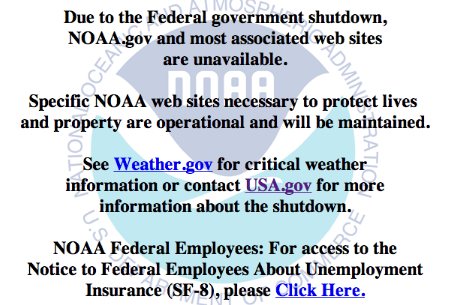What if they gave a conference and everybody (except the hosts) came? That was my surreal experience at a tri-agency confab for 100 climate educators organized by professionals from NASA, NOAA, and NSF. Thanks to the federal shutdown, the organizers couldn't legally attend the meeting held at a hip hotel near the Reagan National Airport.
Since people had already bought their plane tickets and the plans were set, Plan B—holding the meeting without any federal employees present—went into effect late last week when it was evident the shutdown would not be resolved anytime soon, and surrogates helped coordinate and facilitate the meeting.

I had the pleasure of convening the panel yesterday that included Rev. Sally Bingham of the Interfaith Power and Light and Leah Qusba of the Alliance for Climate Education.
A third speaker representing Second Nature, the driving force behind the American College and University Presidents' Climate Commitment, wasn't able to attend, so I did my best to talk through the presentation describing the catalytic work that Second Nature is doing to mobilize higher education to take action on climate change.
Today, Jim Elder from the Campaign for Environmental Literacy speaks to the reality that federal funding for climate education is not a viable option currently; other than a small amount of funding from NOAA, neither NASA or NSF have funding in their budgets for climate education.
In terms of attracting other sources of funding, is literacy or education the right frame to use? Elder suggested that many private foundations funding climate-related efforts are more focused on "engagement" than on education, so literacy is likely not the right frame to attract funding from the philanthropic world right now. Energy education might be a better approach in the near term.
Elder said that the cap and trade bill, had it been successful, could have provided up to a billion dollars a year for education, which could have been a game changer in terms of addressing the current gap in people's understanding of climate change. He felt that the corporate world, like the federal government, will sooner or later step up to support climate education, but meanwhile reframing the work of climate and energy literacy as preparing youth for the challenges of the 21st century might have legs.
Another speaker, William Heaton, who is Chief of Staff and Strategic Advisor to the President at the Council on Foundations, speaks about using philanthropic dollars and working directly with federal agencies. The aim? To look at private funders as more than pocketbooks who can fill shortfalls, but rather as partners and collaborators around shared goals.
Private funders are not always clear or transparent about their goals or decision processes, but Heaton's message was "it is all in how you tell your story." Funders often have their own agenda but are looking for how their vision may dovetail and be synergetic with a potential projects' story and vision.
